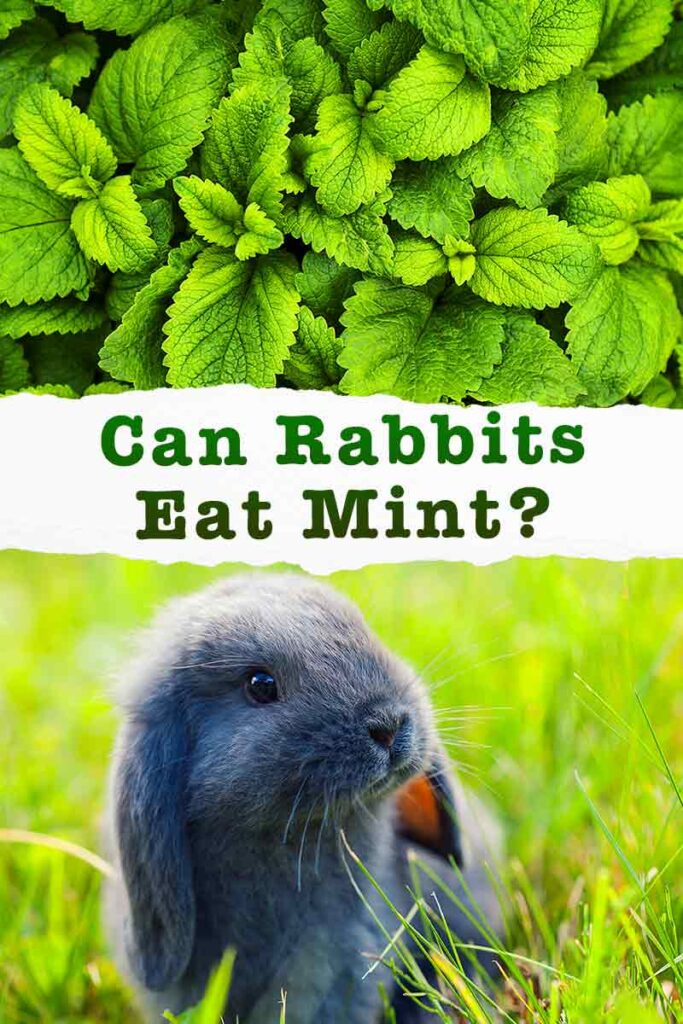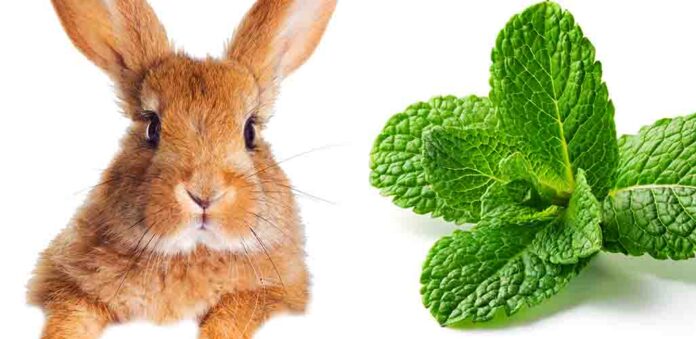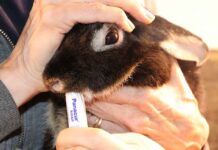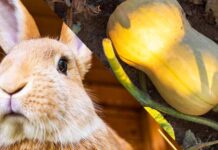Can rabbits eat mint, or is it bad for them? In this article we take a look at whether mint is a safe snack for bunnies, which bits of the plant are best, and how to make sure you don’t accidentally make your pet sick.
- Is mint safe for rabbits?
- Why do rabbits like mint?
- Is mint good for rabbits?
- When is mint bad for rabbits?
- My rabbit ate mint, what should I do?
- Can mint treat indigestion in rabbits?
- Can baby rabbits eat mint?
- Can rabbits have mint every day?
Most mint species are a safe and healthy snack for rabbits – and one which they enjoy eating too! But some kinds of mint might have unintended consequences or even be toxic to your bunny if eaten in large quantities.
In this sweet video, bunnies Sesame and Miso tuck into a range of tasty, crunchy foods, including mint. Let’s see how mint can form a healthy part of their diet.
Is mint one of the safe herbs for rabbits?
Mint is a family of 24 plant species, which grows easily all over the world, and is a popular culinary herb. The leaves, flowers and stem of the mint plant are all aromatic, and the flavor of peppermint is probably one of the best known tastes in the whole world! Besides peppermint, popular species and hybrids of mint include spearmint, chocolate mint, apple mint, pineapple mint and ginger mint. And they all have their own distinctive scent and flavor.
Most mint species, including fresh peppermint sold in grocery stores and American wild mint, are completely safe for bunnies to snack on. There are a couple of exceptions though, which we’ll come to in a moment. And it’s important to make sure that succulent snacks like mint are limited to about 10% of their daily diet.
Rabbits and mint
Rabbits have adapted to survive on a diet of mostly hay and grass, despite these things having relatively low nutritional value. Their teeth grow continuously to keep up with the demands of almost constant chewing. And their digestive system includes a special chamber called a cecum, which is full of bacteria to help break down their food and extract maximum energy and nutrition from it.

Mint is very dissimilar to grass and hay in a lot of ways, so rabbits can’t eat it as a direct substitute for their usual diet. But most rabbits enjoy the opportunity to have some mint as part of their diet.
Why do rabbits like mint?
Rabbits are highly selective grazers. When you’re trying to live off some of the least nutritious food on Earth, starting with the best bits makes a big difference to how much nutrition you can gain from it overall! Whilst rabbits mostly rely on grass and hay which they can find all year round, they also love the young growing shoots of perennial plants like mint when they appear. Even pet rabbits, who never run short on high quality hay and grass, are hardwired to appreciate some leafy plants when they’re available. Rabbits also have a sophisticated sense of smell and taste, so aromatic herbs like mint are a sensory treat too.
That said, the strong taste of mint means that not all rabbits enjoy it. Some love it, some only like particular species, and some prefer only the bits of the plant where the flavor is less intense (like the flowers).
Is mint good for rabbits?
In moderation, some mint can be good for rabbits. Fresh peppermint is a source of:
- Calcium, for healthy bones and teeth.
- Potassium, for proper function of muscles and nerves.
- Folate, to help red blood cells transport oxygen around the body.
- Vitamin A, for eyesight, immunity and cell growth.
Offering bunnies a wide variety of plants, fruits and vegetables can also be a valuable source of mental enrichment. Rabbits are curious and active little animals, and providing a range of different plants from things like feeding balls and hanging baskets can be a beneficial way of meeting their need for mental stimulation.
When is mint bad for rabbits?
Mint is rarely dangerous for rabbits, but there some risks to avoid:
- Overeating. Rabbits are adapted to eat tough, low-nutrient grasses and hay. If succulent foods like fruit, veg, and other herbs make up more than 10% of their daily diet, it can cause dental problems and digestive upsets.
- Pennyroyals. European Pennyroyal is a member of the mint family, and American False Pennyroyal is a somewhat distant cousin. They both contain a chemical compound called pulegone, which is hepatotoxic in high concentrations, meaning it damages the liver. Too much exposure can cause seizures and even death. The most severe side effects are usually associated with ingesting pennyroyal essential oil, but we think with so many 100% safe alternatives available, there’s no sense in risking giving them fresh leaves either.
- Spearmint. Spearmint is not toxic, but it has been observed to have an anti-androgenic effect in rats and humans. This means it stops the action of important hormones like testosterone. It’s not clear exactly how this could affect rabbits, and how much they would need to eat for it to take effect. But to be on the safe side, we recommend limiting spearmint snacks to just the occasional leaf.
Can rabbits eat mint leaves, stems, flower and roots?
Yes! Apart from the exceptional species above, all parts of mint plants are safe for bunnies to eat. Since mint grows vigorously and regenerates from small fragments, some rabbit parents give their pet a whole potted up plant to graze on as an enrichment activity. The minty flavor of mint isn’t evenly distributed in the plant, so you might notice your pet has favorite bits, and bits that they’re… less keen on.
Can rabbits eat chocolate mint?
Again, yes! Chocolate mint has attractive dark purply brown stems, and smells deliciously of chocolate mint. But it tastes like orange! Chocolate mint doesn’t actually contain cocoa or citrus though, so it is safe for bunnies to taste. They might not approve though!
Can rabbits eat fresh mint?
Rabbits should always enjoy their mint snacks in the form of fresh mint grown in your garden or bought in the store. Rabbits shouldn’t consume mint sauces, jellies, candies or chewing gum.
My rabbit ate mint, what should I do?
Since mint is safe and non-toxic to rabbits, there’s no need to do anything if your bunny somehow gets hold of some in an unplanned fashion. Watch them and see how they react to it though – you might just have a new favorite snack to treat them to!
Will mint treat indigestion in rabbits?
In humans, drinking peppermint tea or chewing a few mint leaves is a popular remedy for indigestion. In rabbits, digestive disorders are one of the most common reasons for needing veterinary attention. But, a rabbit’s digestive system could scarcely be more different to a human being’s. And if you think your rabbit is experiencing digestive discomfort, it’s important to seek veterinary advice right away.
Can baby rabbits eat mint?
Baby rabbits are usually weaned between 5 and 8 weeks old. From this time, they are ready to start eating small portions of fresh produce, including mint. It’s important to introduce new foods gradually though, so that the immature bacterial colony in their cecum has time to adjust.
Is it safe for rabbits to have mint every day?
With the exception of spearmint and pennyroyal, mints are safe for rabbits to enjoy everyday. They’re likely to enjoy receiving a mix of produce though, and offering a variety of different foods is a great way to add interest and stimulation into their daily routine. You can also present your bunny’s fresh mint in changing ways – for example
- sprigs tucked into paper bags
- served in a hanging in a basket
- bunches tied to the wires of their hutch
- or planted in a pot.
What plants can rabbits eat – alternatives to mint
For more ideas about what fresh produce to offer your bunny, don’t miss our guide to feeding your rabbit, which includes the answers to ‘can rabbits eat basil?’ and ‘can bunnies eat cilantro?’
Can bunnies eat mint – summary
The answer to ‘can you eat mint leaves and share some with your bunny?’ is yes! However, it’s best to avoid spearmint and pennyroyal, and to make sure leafy herbs and fresh produce are limited to no more than 10% of their diet. Does your bunny love chewing mint leaves? Tell us how your serve this tasty snack in the comments box down below!
References
FoodData Central. U.S. Department of Agriculture. Accessed March 2022.
Grant & Ramasamy. An Update on Plant Derived Anti-Androgens. International Journal of Endocrinology & Metabolism. 2012.
Kumar et al. Spearmint induced hypothalamic oxidative stress and testicular anti-androgenicity in male rats – altered levels of gene expression, enzymes and hormones. Food and Chemical Toxicology. 2008.
Pennyroyal Oil. LiverTox: Clinical and Research Information on Drug-Induced Liver Injury. 2020.
Stapleton. There’s no such thing as a free meal: environmental enrichment for rabbits. The Veterinary Nurse. 2015.














